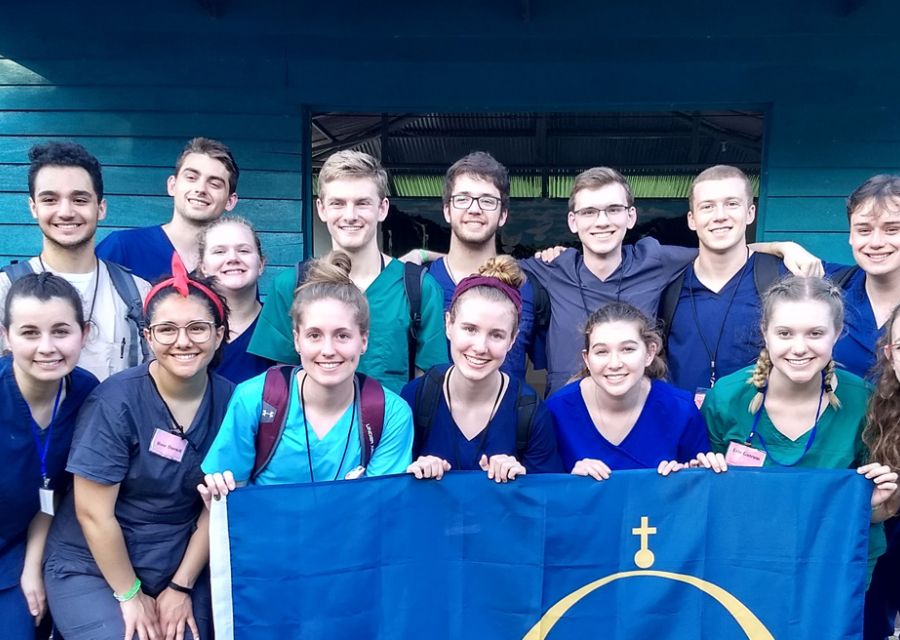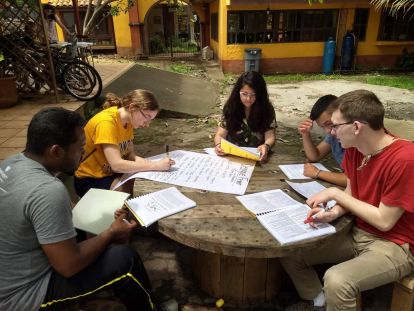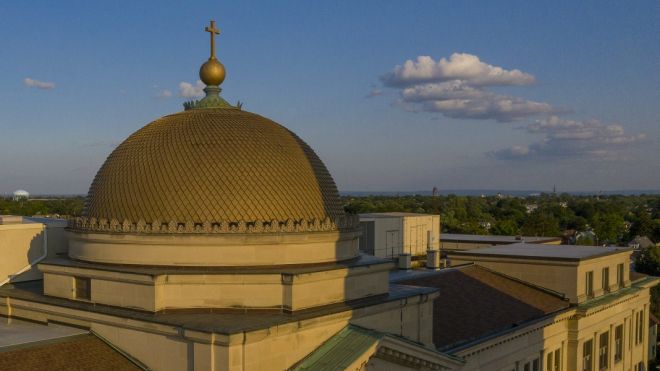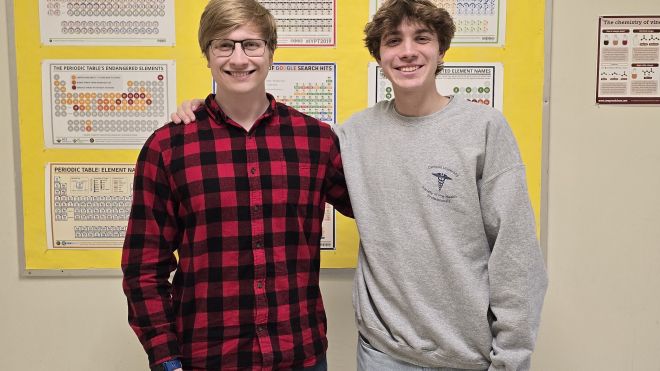
Pre-health students enrich their perspective in Costa Rica
“I came out of Costa Rica a changed individual, with a new appreciation for humanity as a whole.”
Alyssa Deacon ‘22
For aspiring doctors, it’s not enough to acquire a set of technical skills. Success will also depend on being able to appreciate the social, cultural and economic determinants of health. Meeting patients in their own communities is a valuable step—even when that means boarding a plane for another part of the world.
Each year a group of Canisius pre-health students travel to Central America, where they observe and assist local doctors and dentists. Working with Spanish-English interpreters, they practice taking patient histories and vital signs like blood pressure, pulse and respiratory rates.* “Students get to directly interact with patients and learn their stories,” says Allyson Backstrom, PhD, director of the Dr. George E. Schreiner ’43 Pre-Medical Center. Dr. Backstrom recently accompanied 16 Canisius undergraduates on a two-week immersion in Costa Rica. The group was made up of pre-med, pre-dental and pre-vet students, and a budding ornithologist.
Serving a refugee population
In Río Azul, just southeast of San Jose, the houses are small and close together, and as many as ten people might live together in one squalid location. La Carpio, one of Costa Rica’s poorest communities, is situated between two polluted rivers and is home to San Jose’s biggest landfill. “Garbage fills the sidewalks and waste trucks line up on the only road that leads from the dump to San Jose from dawn to dusk,” explains Alyssa Deacon ’22.
Against this backdrop of pollution and poverty, the students helped set up popup clinics for Nicaraguan refugees who have settled here. The refugees showed up with a variety of ailments, including viruses, fungal infections, asthma and anemia, all directly linked to their harsh living conditions. Because many are undocumented, they are ineligible for the country’s universal healthcare system.
Brian Cornell ’21 describes a woman with glucose levels that were so high, even the doctor was shocked. “Normally, glucose levels should be around 100, but this patient’s was at almost 550. I asked her if she took any medication for it, and she said that she used to, but since she is a Nicaraguan refugee, she doesn’t get free healthcare and can’t afford the medication.” The doctor gave her a month’s supply of medication, and Cornell and his fellow students helped educate the woman how to control her blood glucose levels by exercising and avoiding foods with sugar.
In addition to working at the clinics, the students conducted public health home visits. Sarah Batt ’21 remembers a woman who had come to the clinic with a severe cough and congestion. A follow-up home visit helped her understand what was making the woman sick. “Her house was dark, the floor was covered in dirt, and the only ventilation was the front door, which did not even lock. There were no windows.”
While making their way to the ramshackle homes, the students saw piles of festering garbage and malnourished, flea-ridden dogs roaming the streets. Erin Guntrum ’21 couldn’t easily distinguish between the many strays and the pets who had been allowed outside. Guntrum, who plans to attend veterinary school, teamed up with another pre-vet student, Leanne Walker ’20, to help local veterinarians conduct spay and neuter clinics. “We had a line out the door and down the street of people bringing their dogs and cats for vaccines,” Guntrum says. The love the owners felt for their pets was palpable.
Learning from indigenous people
Closer to the Caribbean coast, the mountainous region of Bajo Chirripó is home to the Bribi, an indigenous tribe. Unlike the cramped living spaces in the refugee communities, the houses in Bajo Chirripó are far apart and situated on farms. And because of the rough terrain and historical marginalization, the Bribi lack access to medical services.
The Canisius students helped local doctors set up two popup clinics—one in an empty chapel and the other in a small school building. “Our patients walked miles, through shallow swamps and over steep hills, to come and be treated at our clinic,” Deacon explains. Because the people work long days out in the hot sun, a major complaint was headaches caused by constant squinting. Sunglasses were among the supplies the Canisius group brought with them.
Although the students were there to assist and to teach health tips, Deacon soon discovered the education went both ways. One indigenous woman, speaking in her native dialect, described a few natural remedies. Her husband translated her words into Spanish, and the interpreter explained everything in English. Deacon learned about the connection between the phases of the moon and local planting cycles. “When I came back to our hotel, I could not help but look up at the sky on the sandy beach and notice all of the stars.” At another patient’s home, she learned how to make thread from leaves and paint with ginger.
The role of cura personalis
Rose Durnell ‘21 had been to Costa Rica once before—during high school for a brief vacation—but this trip opened her eyes to challenges easily hidden from a tourist’s view. “It was incredible to see so many banana plantations and cargo containers, and then make the connection to health issues,” she says. Many patients suffered from respiratory issues, likely caused by extended exposure to pesticides and other chemicals at their worksites.
For Batt, the time in Costa Rica has given her a new perspective on healthcare. “This trip taught me so much about how physical, mental, emotional and social health all interconnect.” Backstrom’s hope is that the lessons endure long after students have completed their medical education. “It doesn’t matter where you are or who you are. Each person has a story and a background.”
*The medical activities the students take part in are consistent with the type of work they would be allowed to do in the United States.




